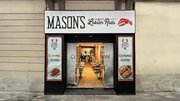Article
Emerging Concept: City Bites is ready to roll
Blevins brothers created this fast-casual concept. Now they're prepared to take their sandwich chain national.

September 25, 2006 by Julie Sturgeon — independent journalist, CEOEditor, Inc.
City Bites may be a family-owned restaurant company ready to expand, but the brothers who operate the Oklahoma City-based sandwich chain are being cautious — and with good reason. Mark, Brad, Gary and Eric Blevins tried to franchise last decade, selling a store to Creative Restaurants Concepts. That attempt failed and today, the company only has one franchisee .
"These guys [the Blevins] are very hands-on, and I think they wanted the control. They weren't ready to turn it loose," said Brian Bishop, City Bites' lone franchisee in Wichita, Kan., of the false start in 1996.
The deli currently boasts 16 units in the Oklahoma City market, with a 17th on the drawing board. The crew serves up breakfast, lunch and dinner, with hot and cold custom sub sandwiches, salads and oversized spuds stuffed with mesquite chicken.
The Blevins believe it's time to take City Bites to new places. They said 20 years is long enough for a generation of diners to grow up, move away from the Sooner State and miss the taste of their youth. The Blevins often field calls from area codes ranging from Dallas to Myrtle Beach, with folks saying, "I've moved — when will you bring City Bites here?" One day, Quizno's was the caller on the other end, probing to see if it could buy them out, back when both companies were approximately 10 units in size.
"It's just time we venture back down that road and let somebody else help grow the business," Mark said. "It's all about staying power. We've proved we can duplicate the concept, so it's time to say we are a viable, successful operation. That's how you collect on that sweat equity. You quit selling just sandwiches and start selling some of your knowledge."
Brotherly love
Control was the family's saving grace at the start-up stage. The Blevins once operated a family landscaping business, building gazebos, decks, waterfalls and reflection pools for upper-income families — skills that allowed them to build the company's first 800-square-foot space in 1986. Even today, they keep a drafting table at headquarters, using architects only when city codes require one to sign off on a blueprint. The brothers pour the concrete, foot the plumbing and raise the walls. Each unit also features a different décor, ranging from whimsical to ethnic to pop art.
"We do a lot of art pieces that would be high end, and I don't think they'd pay for themselves selling at $5 a sandwich if we farmed them out," Gary said.
The brothers picked up other business lessons along the way: They learned to manage cash flow and how to assess a piece of equipment's cost in terms of how many sandwiches it could generate. But the restaurant business requires more personnel finesse, Mark pointed out, as the family deals with 260 employees, many of them students with irregular schedules.
"And we have to wash our hands a lot more in the restaurant business," joked Eric. "People didn't mind dirt on our hands when we were landscaping."
Employees say the four brothers offer four different perspectives at times — and on other occasions they speak with one voice. No one takes sole responsibility for any one area; the crew meets at the office every morning to determine what needs attention, then splits up and heads out to the stores. For example, Gary may handle purchasing one day and Eric takes over on the next day. They claim no official leader, although Mark is the oldest of the tribe.
This company structure has worked; City Bites is thriving. Ten years ago, the average check was $5.50. Today it's between $13 and $14, with nine of the 16 stores showing double-digit increases in same-store sales year over year. They anticipate the 2006 total sales will fall in the range of $7.5 to $8 million.
Bishop reports his store is "definitely profitable," although he declines to project an ROI future franchisees could anticipate. "I will say it needs to be a deal where they roll out a couple of stores to get a little more name recognition in a new spot," he said. "But they can bring a good return."
Yet it's not the numbers he praises for his success. "The Blevins are very accessible. I have every one of their cell phone numbers so I can get them any time. They're going to be great franchise owners," Bishop said.
Time to fly
Currently, the Blevins are redrafting their franchise offering circular and developing a prototype store that will play on a national stage. They understand fully what must change to make the switch, starting with the size.
The corporate stores often fall in the 3,000-square-foot-and-up range; Eric said 2,400 square feet will work better for franchised stores. They intend to add drive-thrus where feasible, and place the units closer together in markets.
"Today's eating trends are that people will drive pretty much to the first hub or intersection with restaurants and choose. Destination location is becoming less of a term applicable to fast-casual," said Brad.
They'll need to use more traditional advertising venues, too, the gang admits. Currently they spend less than a tenth of a percent of total sales in this area, relying instead on community participation to get the word out.
But what won't change are things like food quality and store hours, which are set to allow their student workers a chance to balance family life and school participation.
"At some point you make a moral decision," explained Mark. "Consultants tell us it's a risk in the profit area, but one of the things we like is being able to hold to those values.
This article originally appeared in Fast Casual magazine.
 ChatGPT
ChatGPT Grok
Grok Perplexity
Perplexity Claude
Claude












